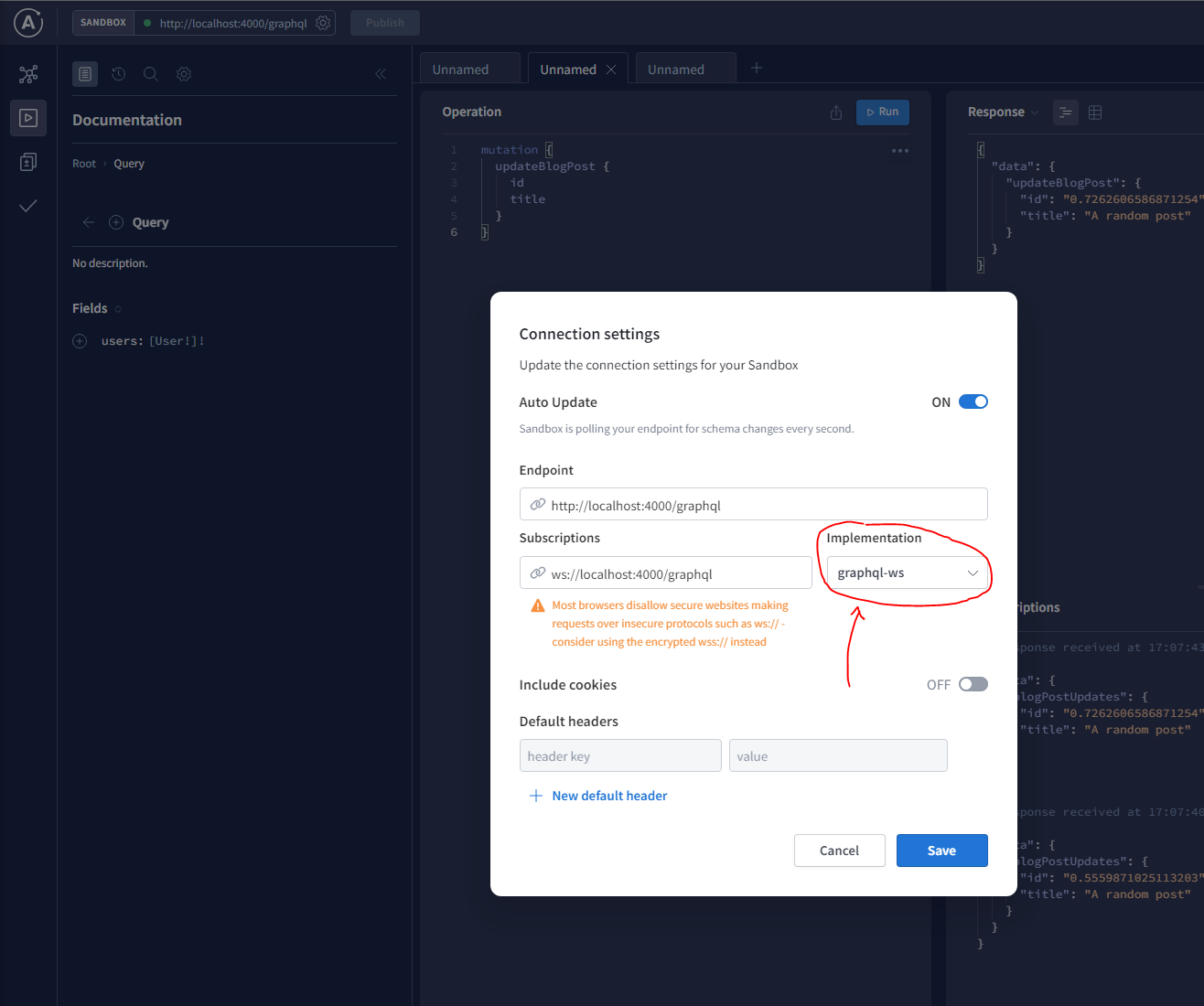[DEPRECATED] Apollo Federation with Subscriptions
NOTE: This project is deprecated as Federation now supports subscriptions without the need for any wrappers https://www.apollographql.com/blog/announcement/backend/federated-subscriptions-in-graphos-real-time-data-at-scale/.



This library introduces subscriptions to Apollo Federation (which is currently not supported by apollo-server). Under the hood, it is using graphql-tools to convert the federation into schema-stitching SDL.
This library currently only works with express servers.
Installation
yarn add federation-with-subscriptions
Simple example
import {
createGateway,
createMicroservice,
} from "federation-with-subscriptions";
import { PubSub, withFilter } from "graphql-subscriptions";
const pubsub = new PubSub();
const usersMicroservice = () =>
createMicroservice({
label: "Users",
port: 4001,
typeDefs: `
type User {
id: ID!
name: String!
}
type Query {
users: [User!]!
}
`,
resolvers: {
Query: {
users: () => [{ id: "1", name: "Sammy" }],
},
},
});
const blogPostsMicroservice = () =>
createMicroservice({
label: "Blog Posts",
port: 4002,
context: ({ req }) => ({ headers: req.headers }),
subscriptionContext: (ctx, message, args, headers) => ({ headers }),
typeDefs: `
type BlogPost {
id: ID!
title: String!
}
extend type User @key(fields: "id") {
id: ID! @external
blogPosts: [BlogPost!]!
}
type Mutation {
updateBlogPost: BlogPost!
}
type Subscription {
blogPostUpdates: BlogPost!
}
`,
resolvers: {
User: {
blogPosts: () => [{ id: "44", title: "The Latest Post" }],
},
Mutation: {
updateBlogPost: () => {
const blogPost = {
id: String(Math.random()),
title: "A random post",
};
pubsub.publish("BLOG_POST_UPDATED", {
blogPostUpdates: blogPost,
});
return blogPost;
},
},
Subscription: {
blogPostUpdates: {
subscribe: withFilter(
() => pubsub.asyncIterator(["BLOG_POST_UPDATED"]),
(payload, variables, context) => {
console.log({
subscriptionContext: context,
});
return true;
},
),
},
},
},
});
const main = async () => {
const microservices = await Promise.all([
usersMicroservice(),
blogPostsMicroservice(),
]);
const { expressApp } = await createGateway({
microservices,
port: 4000,
buildHttpHeaders: ({ req }) => ({
"authorization": "Bearer secrettoken",
}),
buildSubscriptionHeaders: ({ connectionParams }) => ({
"authorization": "Bearer secrettoken",
}),
});
};
main();
If you run the above in a Node.js environment, you can visit http://localhost:4000/graphql which will open the Apollo Studio.
Important: when testing using Apollo Studio, ensure that you switch the subscriptions implementation to graphql-ws:

{
users {
id
name
blogPosts {
id
title
}
}
}
subscription {
blogPostUpdates {
id
title
}
}
mutation {
updateBlogPost {
id
title
}
}
Subscriptions on the Frontend
Please checkout this repo and run yarn install & yarn start for a slightly more complex example including a full frontend integration.
License
federation-with-subscriptions is MIT licensed.







